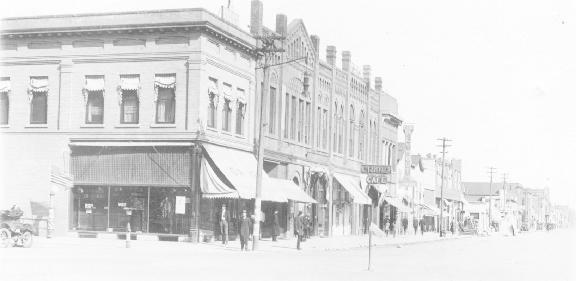| Era Bell Thompson (1905-1986) |
| Black North Dakotans were a rarity during the childhood years of Era Bell. She once remarked that when they traveled thirty miles to join two other black families for Christmas dinner, "there were fifteen of us, four percent of the state's entire Negro population." |
| Era Bell Thompson was born on August 10, 1905 in Des Moines, Iowa and moved with her family to North Dakota in 1914 when she was 9 years old. She and her three brothers were excited about the move, because they expected cowboys and Indians. But the most they got was her Uncle James, who had homesteaded here seven years before.
Era's schoolmates had never before seen a black person. The experience was agonizing, with classmates laughing at her, trying to touch her hair and staring at her light-colored palms. After some time, Era made friends, but she felt out of place. |
Eras father had a tough go as a farmer, and three years later when Eras mother died, the family moved to Bismarck, where he was working for Governor Lynn Frazier as a private messenger.
Even in this larger town, there were only two black students. Again, a hush fell over the schoolyard when Era showed up for school. Now in 7th grade, Era learned to loathe Friday afternoons when boy-girl games were played. Worse, one of her textbooks informed that all black people were thick-skulled. And on the days that slavery was discussed, Era cut class. Despite soon distinguishing herself as a gifted runner, on the bus she sat in aisle seats so onlookers wouldnt gawk at her.
She graduated from Bismarck High School in 1924 and subsequently enrolled at the University of North Dakota - Grand Forks. But the YWCA refused her a room and the streetcar would pass her by when she tried to board, and job positions were suddenly filled when she applied. She finally found a job working for a Jewish family in the part of Grand Forks known as Little Jerusalem.
In college, she fell back on what she had learned from her experiences in Driscoll and Bismarck. She survived the prejudice and made friends. She also pursued her love of running, breaking five UND womens track records in dashes, broad jump and hurdles and tied two national records. She also began writing for the campus paper, showing herself to have a substantial wit and talent. |
 |
| Main Street Mandan c. 1920s |
|
|
|
She attended UND for two years. Their family had moved to Mandan where her father operated a used furniture store. When her dad died, Era went back to Mandan to run the used furniture store so she could pay off his debts. A white pastor and his family took her in as their foster child encouraged her to return to college and earn her degree.
She transferred to Morningside College in Sioux City, Iowa where earned a journalism degree. After graduation she began her career in Chicago in 1933, first finding work as a housekeeper then with The Chicago Defender. In Chicago, found just as much prejudice among blacks as among whites.
Despite her college degree, she found very little opportunity for a good job. With the beginning of the Great Depression, she worked at a Settlement House and got jobs through the Works Progress Administration (WPA). In 1945, Thompson was awarded a Newberry fellowship, which supported her while she wrote her autobiography, American Daughter in 1946. Thompson eventually became editor of Negro Digest, then joined Ebony magazine in 1947. She was co-managing editor of the magazine from 1951 to 1964, then international editor from 1964 until she retired. |
During her journalism career, Thompson reported from Africa, India, Australia, South America and the South Pacific. In 1953, she traveled through 18 African countries for her book, Africa Land of my Fathers. It recounts her frustrated attempts to comprehend her ancestral heritage, and many of her later essays denounce men's treatment of women regardless of race and class. She spent a night in a South African jail in 1957 because authorities said there were no hotel rooms for Blacks.
Thompson died on December 30, 1986 in her Chicago home.
The multicultural center at the University of North Dakota - Grand Forks was named after her. She was inducted into the UND Athletic Hall of Fame in 1986. She was awarded North Dakota's Theodore Roosevelt Roughrider Award in 1976. | |
|